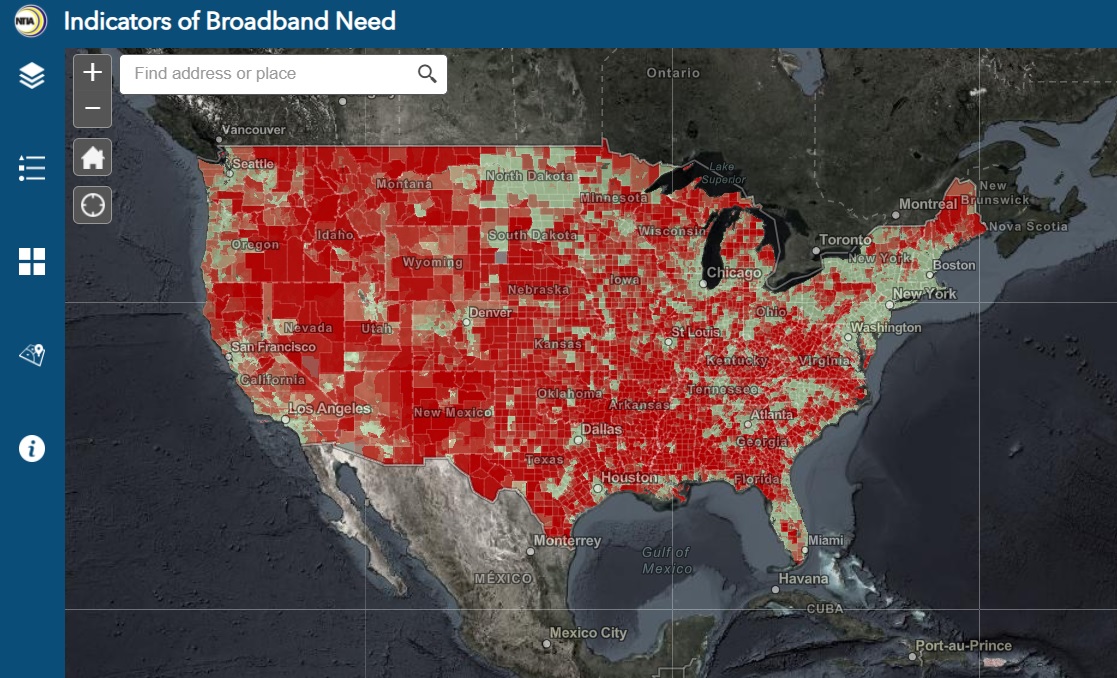NCTA: New NTIA Broadband Needs Map Is 'Often Inaccurate' Mashup
Cites what it said is some bad data

The smarter way to stay on top of broadcasting and cable industry. Sign up below
You are now subscribed
Your newsletter sign-up was successful
Cable broadband operators represented by NCTA-the Internet & Television Association, are no fans of the Biden Administration's new broadband mapping tool, which was unveiled by the National Telecommunications & Information Administration last week.
NTIA billed it as the first interactive map showing "key indicators of broadband needs across the country," combining data from different public and private sources aggregated at the county, census track and census block levels.
The goal said NTIA is to "illustrate the reality that communities experience when going online, with many parts of the country reporting speeds that fall below the FCC’s current benchmark for fixed broadband service of 25 Mbps download, 3 Mbps upload."
But NCTA said the picture is far from reality.
Also Read: FCC, NTIA Team on Spectrum Research
“NCTA has long supported federal efforts to create a reliable, accurate broadband map and we have been working with the FCC on its implementation of the Broadband Data Act," the NCTA said. "Unfortunately NTIA has obscured, rather than clarified, the true state of broadband with this mashup of disparate, and often inaccurate, data sources. In particular, any suggestion that data from M-Lab or Microsoft accurately represents the speeds delivered by cable operators is demonstrably false.”
Richard Bennett, founder of High Tech Forum, said that while the map has some value for digital inclusion activists, it tried "to do too many things," and agrees with NCTA that the M-Lab and Microsoft data are unhelpful.
The smarter way to stay on top of broadcasting and cable industry. Sign up below
"Overall, I suspect the Indicators of Broadband Needs tool will further confuse the digital divide debate by introducing bad data to a wider audience," said Bennett.
He said the data doesn't answer questions of how to reach communities with limited interest or ability to use broadband, not because it is a bad map but because the data is already out of date.
Bennett said the digital divide is actually two divides. In unserved areas, nobody can buy high quality at any price, which is a civil engineering problem that Congress loves because the answer is to throw money at it. The other divide, and the bigger problem, is that "for every one person who can’t buy broadband there are two unconnected people who could get it today if they had the means and the interest to do so," he said.
That is a social problem, said Bennett, which Congress hates because it is "messy and complicated."
Microsoft had not responded to a request for comment at press time. M-Lab was not reachable for comment.
Contributing editor John Eggerton has been an editor and/or writer on media regulation, legislation and policy for over four decades, including covering the FCC, FTC, Congress, the major media trade associations, and the federal courts. In addition to Multichannel News and Broadcasting + Cable, his work has appeared in Radio World, TV Technology, TV Fax, This Week in Consumer Electronics, Variety and the Encyclopedia Britannica.

